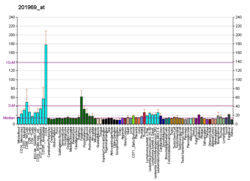NASP (gene)
Appearance
Nuclear autoantigenic sperm protein is a protein that in humans is encoded by the NASP gene.[5][6] Multiple isoforms are encoded by transcript variants of this gene.
Function
This gene encodes a histone H1 binding protein that is involved in transporting histones into the nucleus of dividing cells.[7] The somatic form is expressed in all mitotic cells, is localized to the nucleus, and is coupled to the cell cycle. The testicular form is expressed in embryonic tissues, tumor cells, and the testis. In male germ cells, this protein is localized to the cytoplasm of primary spermatocytes, the nucleus of spermatids, and the periacrosomal region of mature spermatozoa.[6]
References
- ^ a b c GRCh38: Ensembl release 89: ENSG00000132780 – Ensembl, May 2017
- ^ a b c GRCm38: Ensembl release 89: ENSMUSG00000028693 – Ensembl, May 2017
- ^ "Human PubMed Reference:". National Center for Biotechnology Information, U.S. National Library of Medicine.
- ^ "Mouse PubMed Reference:". National Center for Biotechnology Information, U.S. National Library of Medicine.
- ^ O'Rand MG, Richardson RT, Zimmerman LJ, Widgren EE (Dec 1992). "Sequence and localization of human NASP: conservation of a Xenopus histone-binding protein". Dev Biol. 154 (1): 37–44. doi:10.1016/0012-1606(92)90045-I. PMID 1426632.
- ^ a b "Entrez Gene: NASP nuclear autoantigenic sperm protein (histone-binding)".
- ^ Alekseev OM, Widgren EE, Richardson RT, O'Rand MG (January 2005). "Association of NASP with HSP90 in mouse spermatogenic cells: stimulation of ATPase activity and transport of linker histones into nuclei". J. Biol. Chem. 280 (4): 2904–11. doi:10.1074/jbc.M410397200. PMID 15533935.
Further reading
- Welch JE, Zimmerman LJ, Joseph DR, O'Rand MG (1991). "Characterization of a sperm-specific nuclear autoantigenic protein. I. Complete sequence and homology with the Xenopus protein, N1/N2". Biol. Reprod. 43 (4): 559–68. doi:10.1095/biolreprod43.4.559. PMID 2289010.
- Welch JE, O'Rand MG (1991). "Characterization of a sperm-specific nuclear autoantigenic protein. II. Expression and localization in the testis". Biol. Reprod. 43 (4): 569–78. doi:10.1095/biolreprod43.4.569. PMID 2289011.
- Kleinschmidt JA, Dingwall C, Maier G, Franke WW (1987). "Molecular characterization of a karyophilic, histone-binding protein: cDNA cloning, amino acid sequence and expression of nuclear protein N1/N2 of Xenopus laevis". EMBO J. 5 (13): 3547–52. doi:10.1002/j.1460-2075.1986.tb04681.x. PMC 1167392. PMID 3549279.
- Maruyama K, Sugano S (1994). "Oligo-capping: a simple method to replace the cap structure of eukaryotic mRNAs with oligoribonucleotides". Gene. 138 (1–2): 171–4. doi:10.1016/0378-1119(94)90802-8. PMID 8125298.
- Lee YH, O'Rand MG (1993). "Ultrastructural localization of a nuclear autoantigenic sperm protein in spermatogenic cells and spermatozoa". Anat. Rec. 236 (3): 442–8. doi:10.1002/ar.1092360304. PMID 8363049.
- Batova I, O'Rand MG (1996). "Histone-binding domains in a human nuclear autoantigenic sperm protein". Biol. Reprod. 54 (6): 1238–44. doi:10.1095/biolreprod54.6.1238. PMID 8724350.
- Suzuki Y, Yoshitomo-Nakagawa K, Maruyama K, et al. (1997). "Construction and characterization of a full length-enriched and a 5'-end-enriched cDNA library". Gene. 200 (1–2): 149–56. doi:10.1016/S0378-1119(97)00411-3. PMID 9373149.
- Richardson RT, Batova IN, Widgren EE, et al. (2000). "Characterization of the histone H1-binding protein, NASP, as a cell cycle-regulated somatic protein". J. Biol. Chem. 275 (39): 30378–86. doi:10.1074/jbc.M003781200. PMID 10893414.
- Batova IN, Richardson RT, Widgren EE, O'Rand MG (2000). "Analysis of the autoimmune epitopes on human testicular NASP using recombinant and synthetic peptides". Clin. Exp. Immunol. 121 (2): 201–9. doi:10.1046/j.1365-2249.2000.01303.x. PMC 1905703. PMID 10931132.
- Minami N, Sasaki K, Aizawa A, et al. (2001). "Analysis of gene expression in mouse 2-cell embryos using fluorescein differential display: comparison of culture environments". Biol. Reprod. 64 (1): 30–5. doi:10.1095/biolreprod64.1.30. PMID 11133655.
- Richardson RT, Bencic DC, O'Rand MG (2001). "Comparison of mouse and human NASP genes and expression in human transformed and tumor cell lines". Gene. 274 (1–2): 67–75. doi:10.1016/S0378-1119(01)00605-9. PMID 11674998.
- Strausberg RL, Feingold EA, Grouse LH, et al. (2003). "Generation and initial analysis of more than 15,000 full-length human and mouse cDNA sequences". Proc. Natl. Acad. Sci. U.S.A. 99 (26): 16899–903. Bibcode:2002PNAS...9916899M. doi:10.1073/pnas.242603899. PMC 139241. PMID 12477932.
- Alekseev OM, Bencic DC, Richardson RT, et al. (2003). "Overexpression of the Linker histone-binding protein tNASP affects progression through the cell cycle". J. Biol. Chem. 278 (10): 8846–52. doi:10.1074/jbc.M210352200. PMID 12509435.
- Ota T, Suzuki Y, Nishikawa T, et al. (2004). "Complete sequencing and characterization of 21,243 full-length human cDNAs". Nat. Genet. 36 (1): 40–5. doi:10.1038/ng1285. PMID 14702039.
- Silva AP, Chen J, Carraro DM, et al. (2004). "Generation of longer 3' cDNA fragments from massively parallel signature sequencing tags". Nucleic Acids Res. 32 (12): e94. doi:10.1093/nar/gnh095. PMC 484194. PMID 15247327.
- Beausoleil SA, Jedrychowski M, Schwartz D, et al. (2004). "Large-scale characterization of HeLa cell nuclear phosphoproteins". Proc. Natl. Acad. Sci. U.S.A. 101 (33): 12130–5. Bibcode:2004PNAS..10112130B. doi:10.1073/pnas.0404720101. PMC 514446. PMID 15302935.
- Gerhard DS, Wagner L, Feingold EA, et al. (2004). "The status, quality, and expansion of the NIH full-length cDNA project: the Mammalian Gene Collection (MGC)". Genome Res. 14 (10B): 2121–7. doi:10.1101/gr.2596504. PMC 528928. PMID 15489334.
- Groth A, Ray-Gallet D, Quivy JP, et al. (2005). "Human Asf1 regulates the flow of S phase histones during replicational stress". Mol. Cell. 17 (2): 301–11. doi:10.1016/j.molcel.2004.12.018. PMID 15664198.
- Rual JF, Venkatesan K, Hao T, et al. (2005). "Towards a proteome-scale map of the human protein-protein interaction network". Nature. 437 (7062): 1173–8. Bibcode:2005Natur.437.1173R. doi:10.1038/nature04209. PMID 16189514.






